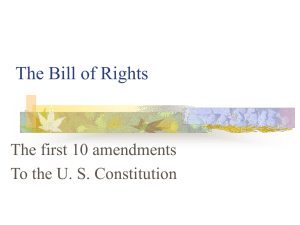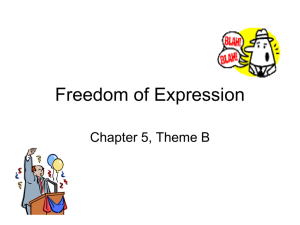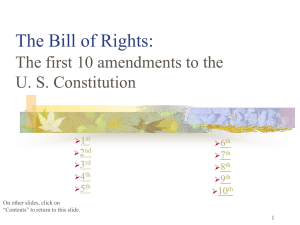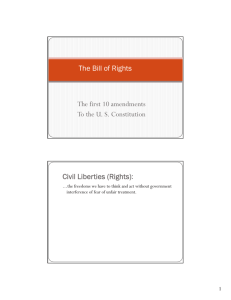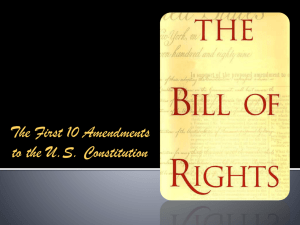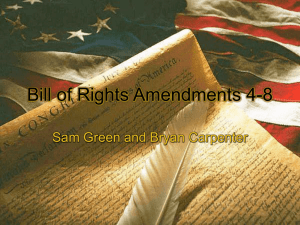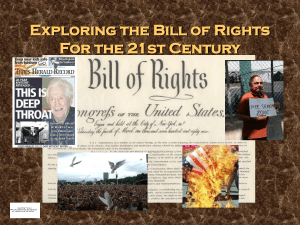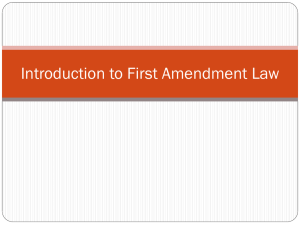The Bill of Rights
advertisement
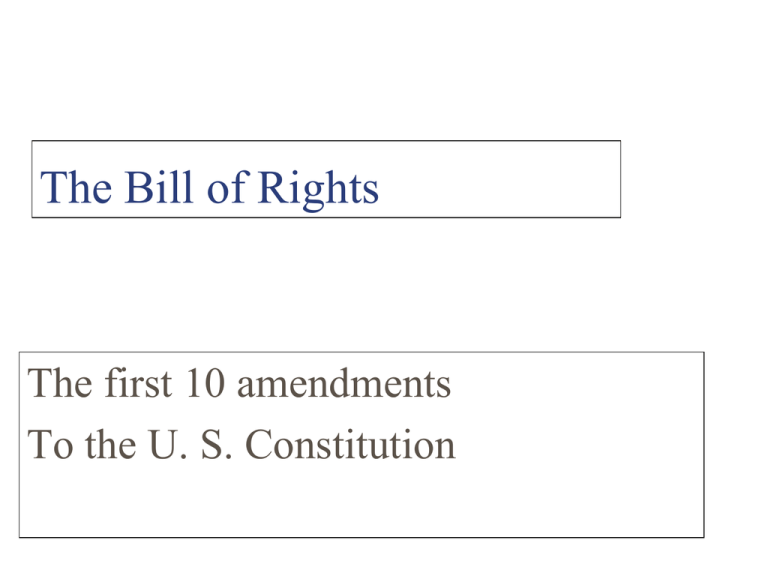
The Bill of Rights The first 10 amendments To the U. S. Constitution Amendment #1 Freedom of Religion Freedom of Assembly Freedom of the Press Right to petition the government Freedom of Speech RAPPS Freedom of Religion—The person Can Cannot Choose whatever religion Lead a prayer in most examples Ask questions about religions Worship who ever you want Break the law and claim it is religious belief Raise children without education Deprave children of basic needs Freedom of speech “Congress shall make no laws . . . abridging the freedom of speech” Free speech– The individual can: Say any political belief Protest (without getting out of control) Say things about someone that are true Burn the flag Say racist and hate slogans Free speech means someone might say something you disagree with Free speech—limits on the person Threaten to blow up airplanes, schools or the president Sexual harassment Create too much social chaos Extremely crude language in a public form Disrespectful, vulgar language in schools Hate crimes Freedom of the press The newspapers, magazines and news can say their beliefs. Congress shall make no law . . . abridging . . . the freedom of the press.” Freedom of the press-the press Can Cannot Print any political position Make fun of people, especially politicians Expose wrongs by the government Say things you might not agree with Libel– intentionally injuring a person’s reputation by false facts Disclose defensesecurity secrets Detail how to make a certain weapons Freedom of Assembly You are allowed to protest peacefully Congress shall make no law . . . Abridging . . . The people to peaceably assemble” Freedom of Assembly--Individual Can Cannot Protest Parade (with a permit) Parade chanting hate slogans Gang members can congregate in public Protest by throwing rocks and breaking windows Hang out on private land against owners will—loitering Teen curfew Petition the Government You can ask the government to change laws and can sue the government. “Congress shall make no law . . . Abridging . . . the people. . . to petition the government for a redress of grievances” Petition the government You may sue the government for wrongs You cannot be punished for exposing wrongs by the government The courts decide the wrongs 2nd Amendment The right to bear arms, you may own a gun “A well-regulated militia, being necessary to the security of a free state, the right of the people to bear arms shall not be infringed.” What is the debate with the right to bear arms? How much can the government keep guns from criminals and youth? In order to keep guns away from criminals, does that limit the right of law abiding citizens? Gun debate continued Shoes representing gun deaths. Thousands of people die every year because of guns Thousands of crimes are prevented because of guns Third Amendment The Government cannot force you to keep soldiers in your home without your approval. Amendments #4-8 - The rights that you have once you have been accused of a crime Fourth Amendment No Illegal Search and Seizure What does a policeman need in order to search your home? A warrant given to him by a judge Probable cause is also needed Fifth Amendment You cannot be tried for the same crime twice— called “Double Jeopardy” You do not have to testify against your self. “I plead the fifth” You must have due process of law before you are convicted (you must be convicted by a jury) Sixth Amendment Right to speedy trial by impartial jury You must be told of charges Sixth Amendment continued You must be able to confront your accuser You must be provided a lawyer if you cannot afford one Seventh Amendment You also have the right to a jury when it is a civil case (a case between you and another person). Eighth Amendment Prisoner kissing his Mom in prison No excessive bail No cruel and unusual punishment Ninth Amendment Just because rights are not in the constitution or Bill of Rights doesn’t mean that you don’t have those rights. Tenth Amendment Any power not given to the Federal Government in the Constitution is considered to be the power of the states.
